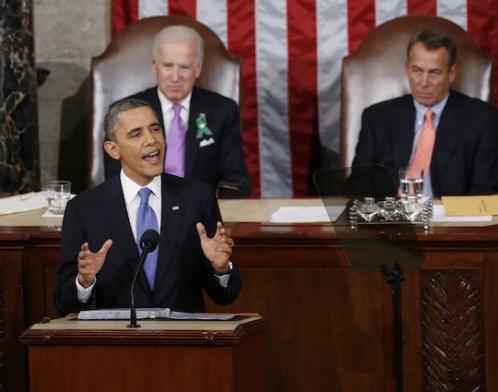The Elephant in the Room
The best State of the Union Addresses attempt to reinvigorate a tired base with a new agenda. On Tuesday, President Obama failed to reinvigorate and proposed little more than the same progressive agenda he has championed for the last four years.
Embracing traditional American ideals of individualism and small business, Obama continued by criticizing the inactive Congress that has failed to pass any one of his proposals as it was first mentioned. He proposed “new” initiatives that begin with closing tax loopholes and include immigration reform, firearms regulations, as well as funding and improving a faltering education system.
In more words, Obama argued that Americans have to join together in compromise. “None of us will get 100 percent of what we want,” he said. And the modern issues associated with immigration restrictions, failing schools, and shuttered businesses impede progress on traditional American questions of advancement through work and equal opportunity across situations.
Obama was surprisingly explicit about the policies he wanted to enact. Included among those ideas were reductions in carbon emissions, advancement in American infrastructure, and improvement of American primary and secondary schools. The latter of these concerns included a new JFK-esque challenge to Americans to “redesign America’s high schools so that they better equip graduates for the demands of a high-tech economy.”
Additionally, the President attacked corporate profits as the highest in recent time and faulted executives for not paying “their fair share” in taxes. Obama consented that the rising cost of government entitlements are the biggest threat to U.S. fiscal solvency, but failed to recognize that those programs require massive reforms to remain feasible.
Rather than calling for business investments and lowering costs, Obama called for an increased minimum wage, a move that would increase costs of doing business and lower employment. Maybe John Boehner said it best when he criticized the proposal on Wednesday, saying, “When you raise the price of employment, guess what happens? You get less of it.”
Now I am not one to congratulate Republicans for immediately doing away with the President’s policies. I look forward to a day when Congress and the President will compromise again, the first step on the way to their Constitutionally-mandated responsibility to govern.
But that is not this day.
The President’s speech was not all superlatives and an unattainable wish list. Several of the President’s proposals make sense. All Americans should be in favor of tying the minimum wage to inflation, strengthening our Southern border while creating a path to citizenship for illegal immigrants, and ensuring value in college educations. Advancing clean energy production is a non-issue. Bringing jobs back to the U.S. is an issue that both parties agree is crucial to economic recovery.
We cannot produce the possible, however, by shielding it beneath the shroud of politically impossible measures.
President Obama invited Apple CEO Tim Cook to the State of the Union. He mentioned Siemens CEO Eric Spiegel. He channeled his inner Berkshire Hathaway CEO Warren Buffett. If nothing else, Obama became the businessman he wants to be when he charted another path for the national American corporation. Never, though, will we advance to that stage.
Instead, he needs to champion the CEOs and corporations that make a positive impact here and abroad. He needs to congratulate the Apple Corporation who vowed to begin making iMacs in the U.S. again. But Obama likewise needs to chastise the CEOs who become political rather than remain business friendly. Yes you, Mr. Buffett.
Mr. Obama quoted Kennedy at the inception of his address. Obama, quoting Kennedy, read, “the Constitution makes us [the President and Congress] not rivals for power, but partners for progress.” To an extent that is right. But ask any of the Framers and the opposite may have been true. The Congress and the President should fight for power, and each should threaten the power of the other. President Obama’s belief that his legislative ideas will advance without opposition is foolish and stands in the face of the American governmental system.
Compromise is forced through this “gauntlet” of sorts. At least the ideas are out there. Maybe the compromise will follow.
Andrew Breland is a sophomore planning to triple major in Political Science, English, and History. At CWRU, Andrew serves as the Vice President of the Case College Republicans and the treasurer for the Case Western Mock Trial Team. After graduation, Andrew plans to attend law school and pursue a career as a civil litigation attorney specializing in Tort defense.


